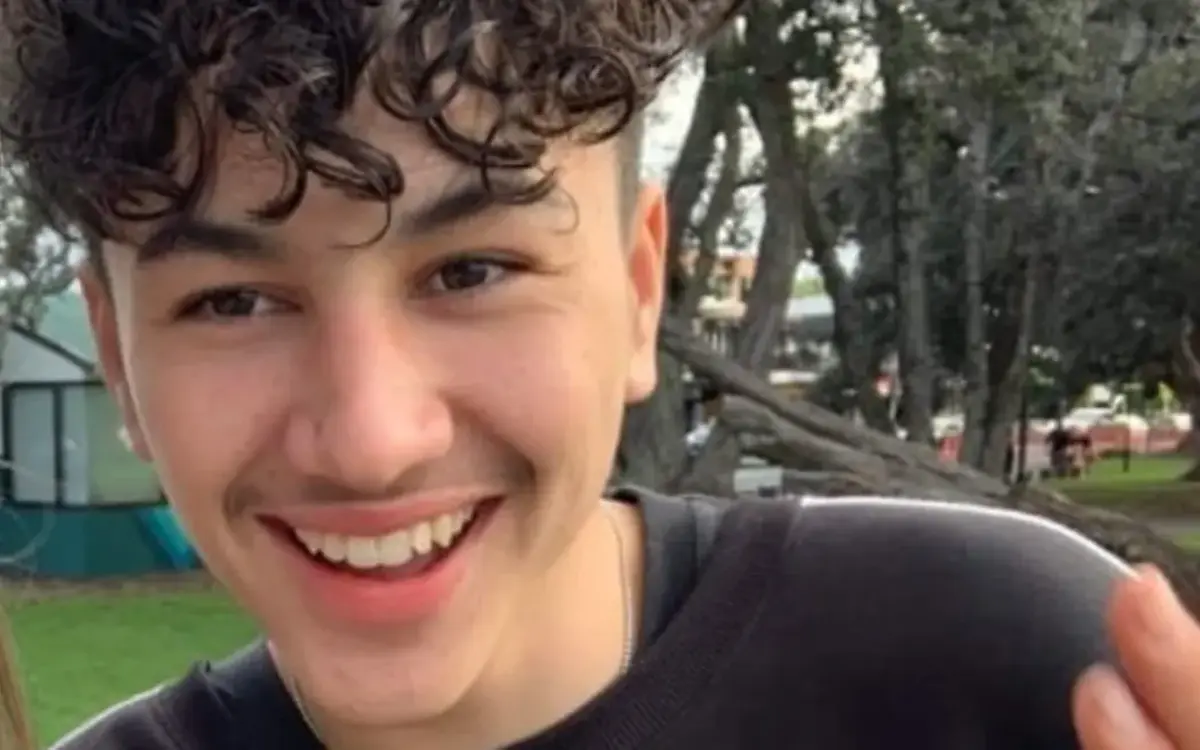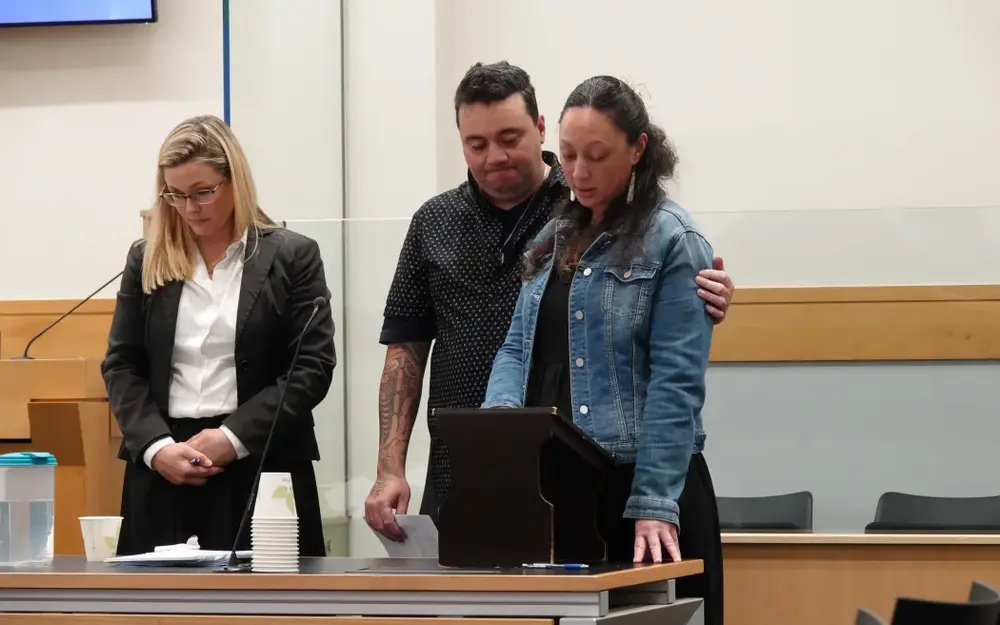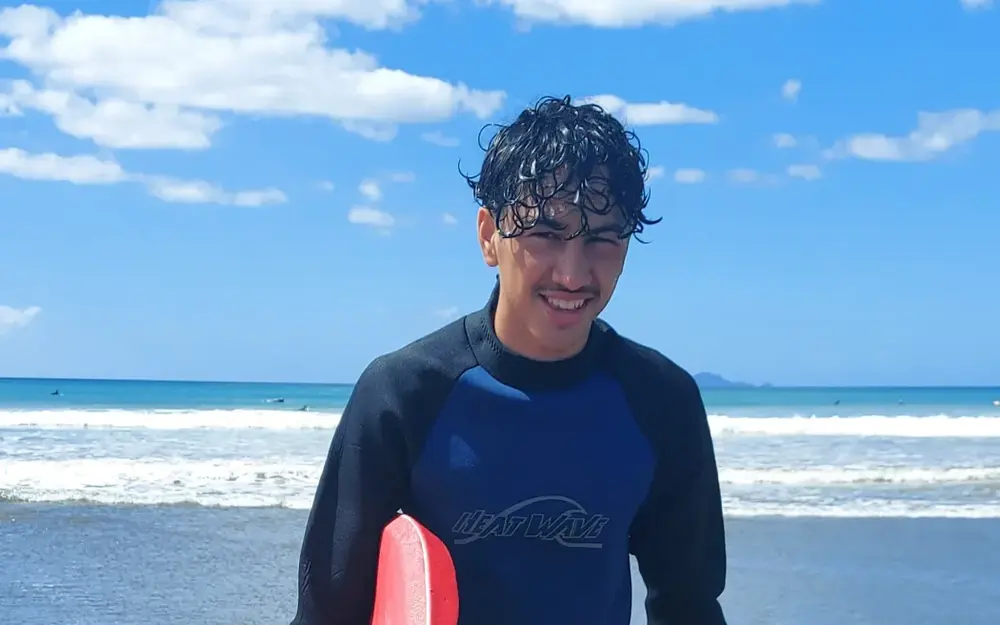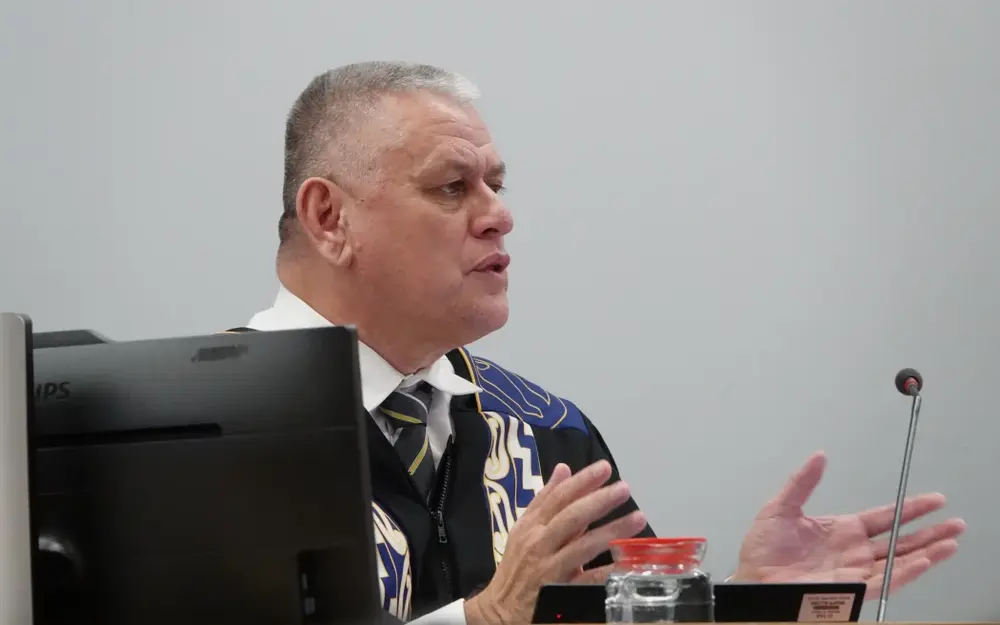Abbey Caves tragedy: Whangārei Boys' High board to pay more than $500k after student's death
RNZ
30 September 2024, 7:17 PM
 Karnin Petera, 15, died when he was swept away in a flooded cave during an outdoor education trip. Photo: SUPPLIED
Karnin Petera, 15, died when he was swept away in a flooded cave during an outdoor education trip. Photo: SUPPLIEDWhangārei Boys' High School has been ordered to pay more than half a million dollars in reparations to the victims of a caving tragedy, including the family of a 15-year-old boy who lost his life.
The school was sentenced in the Whangārei District Court on Friday on two charges laid by WorkSafe of putting people at risk of serious injury or death.
They arose from the death of 15-year-old Karnin Ahorangi Petera in a school trip to Abbey Caves on 9 May 2023.
Judge Greg Davis would have also ordered the school board to pay a fine of about $300,000 - reduced from the starting point of $600,000 for the early guilty plea and other factors - but remitted the fine because the board was unable to pay.
There were also concerns that making the school pay a fine could have a negative effect on student education, including for survivors of the ill-fated trip who were still at the school.
The board was also ordered to pay just over $10,000 in costs to WorkSafe.

Alicia Toki reads her victim impact statement, with partner Andre Petera and lawyer Ellie Harrison. Photo: RNZ / Peter de Graaf
Andre Petera and Alicia Toki spoke in detail during the sentencing, sharing their heartbreak and the multitude of ways their lives have been turned upside-down by the death of their youngest son in the tragedy.
Karnin, who was 15, died after he was swept away by the powerful current inside the flooded cave.
The other 16 boys on the trip, and two adults, managed to get out.
The court was packed with more than 60 people - double the normal capacity - including whānau, family members of some of the other boys, and the school board.
The sentencing opened with karakia and waiata, and Judge Greg Davis addressed the whānau at length in te reo.

Karnin Petera, 15, loved all water sports. Photo: SUPPLIED
The couple's victim impact statement also laid bare the events leading up to their son's death, what they saw as the school's repeated brushing-off of their concerns about heavy rain, and the ongoing impact on their employment and mental and physical heath.
They also paid tribute to their son, nicknamed Tino for his enthusiastic embrace of life, who they said loved te reo and showed great leadership in tikanga Māori.
They described him as funny, a natural performer, outdoorsy and active, with a particular love of basketball and anything to do with water - diving, surfing, bodyboarding, and doing bombs in the lake.
Petera and Toki were too upset to read the rest of their statement, so their lawyer Ellie Harrison - who is acting for the family pro bono - took over, also fighting back tears at times.
Harrison said Tino's Year 11 outdoor education group was originally meant to go rock climbing but that was changed to caving instead, ironically due to forecast bad weather.
Both parents repeatedly asked the school in preceding days if the trip was still going ahead, given the heavy rain falling on Whangārei.

Judge Greg Davis at the sentencing. Photo: RNZ / Peter de Graaf
They knew the caves flooded from time to time, but Toki said she was convinced the school would not let the trip go ahead if it was not safe.
"I had so much trust that the school would look after my son," she said in her statement.
That morning, after Petera dropped their son off, heavy rain continued to fall and he rang the school office several times to express his concerns.
He was brushed off each time but when he called again, some time before 10am, it was clear from the receptionist's tone that something was wrong.
Toki was not answering her phone so he drove to her workplace. On the way, friends texted him to ask if he had heard about students being trapped in the cave.
"I was very angry that the school and everyone else in Whangārei seemed to know about this, but the school would not communicate with me," Petera said.
When they arrived at the caves, the rain was torrential and a police cordon was already in place.
They were told the boys were being taken back to school by bus, and they should go there. Police would not say if all the boys were out of the cave.
At the school, principal Karen Smith gave them the awful news.
"She said, 'All the other kids have come back except Karnin. We haven't been able to locate your son'. … I was in shock. Andre was rolling on the ground screaming. So was his mum."
The family drove back to the caves, where a rescue team was still looking for Tino.
Petera said he collapsed, started vomiting and was put in a wheelchair. At some point in the evening he was put in ambulance and taken to hospital.
Shortly afterwards, rescuers told Toki they had found Tino's body. It took another hour-and-a-half to get him out.
A cousin chased down the ambulance, which brought Petera back to the caves.
"As soon as Tino was brought up out of the caves, six moreporks started calling. As soon as he left, they stopped. It was his spirit that was getting released. It was a tohu [sign]," Petera said.
The couple also spoke of the toll on their relationships, health and work. Both had to pass up new jobs and they had to move house.
Petera said he suffered panic attacks and was sometimes unable to drive; he used to love spending time at the beach with his family but was now afraid of water.
Both said their interactions with the school since Tino's death had amplified their frustrations.
They felt the principal had "passed the buck" to the teachers involved with the caving trip, instead of taking responsibility for broader failings in the school's health and safety culture.
The restorative justice process they went through with the principal and outdoor education teachers - who they still held responsible, in some respects - was, however, well run and gave them the opportunity to say what they needed to say.
Both wanted the school to further review its health and safety practices, and called on the Ministry of Education to provide stricter guidelines for outdoor education, especially water-based activities.
"Tino loved outdoor education and he learned so well outside the classroom environment. We also really support outdoor education. But we just don't want any more children or teachers to die or be seriously injured through education."
'Neither shy nor cocky'
Many other people, including the teachers on the ill-fated trip and parents of Tino's friends and schoolmates, shared harrowing victim impact statements.
They spoke of devastating psychological effects, flashbacks, loss of faith in the school, being tortured by survivor's guilt, and Tino's potential that would now never be realised.
Difficulty in getting help, such as counselling, was another common theme.
Tino's uncle, Karl Petera, spoke of the teen's enthusiasm and his ability in te reo.
"He was neither shy nor cocky, he had an inner confidence that came from knowing his whakapapa. He could light up a room with his smile."
School accepts responsibility for tragedy
Lawyer Marie Wisker, acting for the Whangārei Boys' High School board, said the school fully accepted responsibility and was devastated by what had occurred.
The school also acknowledged the processes it had in place at the time were insufficient, and that those on the trip were put at significant risk.
She said the school felt deep sorrow, in particular for the loss suffered by Karnin's family.
Addressing the whānau in court, Judge Davis said nothing he could say could ease the pain of losing a child.
"All I can do is hope that sentencing will bring some measure of closure for you all," he said.
"This is a tragedy not only for the Petera whānau, an indescribable tragedy, but also for all of the young men on the trip, and all of those associated, directly and indirectly, with what happened that day. I imagine it is something people will think about for the rest of their days."
Details of how the $500,000-plus in reparations will be divided up among the victims - Karnin Petera's family, the 16 surviving boys, a teacher and an outdoor education contractor - have been suppressed.
This story was originally published by RNZ



